What is
T-MEDNet?
T-MEDNet initiative is devoted to develop an observation network on climate change effects in marine coastal ecosystems by spreading the acquisition of standard monitoring protocols on seawater temperature and biological indicators over large-scale and long-term.
T-MEDNet members are Public Research Institutions, Marine Protected Areas and NGOs working in near-shore and coastal zone around the Mediterranean Sea.
T-MEDNet resource platform is dedicated to:

- International cooperation for climate change monitoring in the highly vital, highly dynamic, coastal zone

- Share information, "know how" and expertise on warming signals and biological impacts

- Raise awareness, contribute to update data and information available for stakeholders, decision makers and the interested general public

- Sustain the development of adaptive management strategies to tackle with climate change impacts on marine biodiversity
History
"Connaître le passé, observer le présent pour mieux prévoir l'avenir"
"Knowing the past, observing the present to better anticipate the future"
Jean-Claude Romano
Climate change effects such as shifts in species distribution and mass mortality events have been related to the warming trend observed in the Mediterranean Sea. However, despite the notable exceptions of very few long-term series, there was an enormous gap of knowledge on temperature conditions in coastal waters as well as on ecological effects, which hindered an in-depth analysis of climate change impacts on marine coastal biodiversity.
Since obtaining representative data sets on in situ thermal regimes is crucial to describe the marine environment and analyze impacts. Late in the 1990s, Dr. J.G. Harmelin (Centre d'Océanologie de Marseille) set up the first temperature surveys using autonomous data loggers at three depths (1, 24 and 42 m) in the Marseille area (France). Since then, temperature surveys have been progressively extended to a growing number of sites using the same data loggers and protocols for continuous long-term monitoring, generally at standard depths, every 5 m from the surface to 40 m depth or more.
To date, T-MEDNet involves more than 30 public research institutions and 30 MPAs from 11 Mediterranean countries, under the scientific coordination of the Institute of Marine Sciences (ICM-CSIC). Continuous T-series are now undertaken in +70 sites, resulting in a unified quality checked database of more than 20 million T-samples. Furthermore, T-MEDNet is contributing to track the mass mortality events and shifts in species distribution, the main ecological effects of marine heatwaves and warming, in more than climate change are being monitored in 150 areas across the Mediterranean resulting in the most comprehensive datasets on ecological climate change impacts.
The implementation of these monitoring activities proved to be crucial for increasing our detection, understanding and forecasting abilities on climate change effects in Mediterranean coastal ecosystems.
These abilities will be key to develop realistic climate change impacts and vulnerability assessments and implement sound management plans for the conservation of the rich Mediterranean biodiversity.
Maps on the deployment of sites
and temperature data acquired
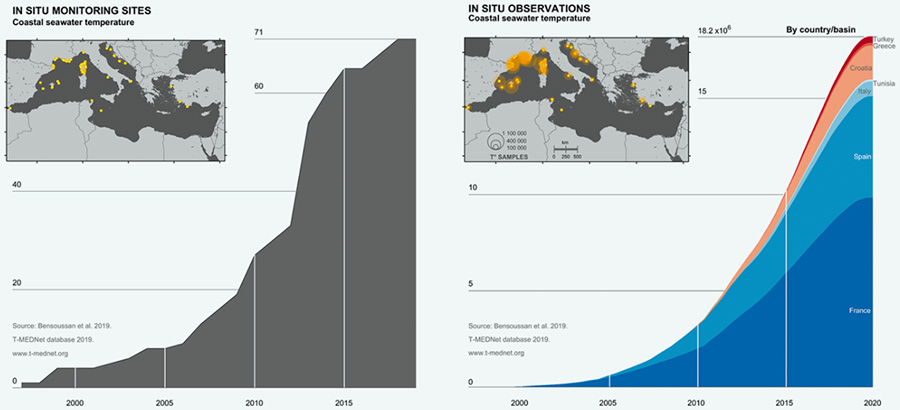
Contributions
T-MEDNet is contributing to track and assess climate change effects on marine coastal ecosystems by providing sound information on:
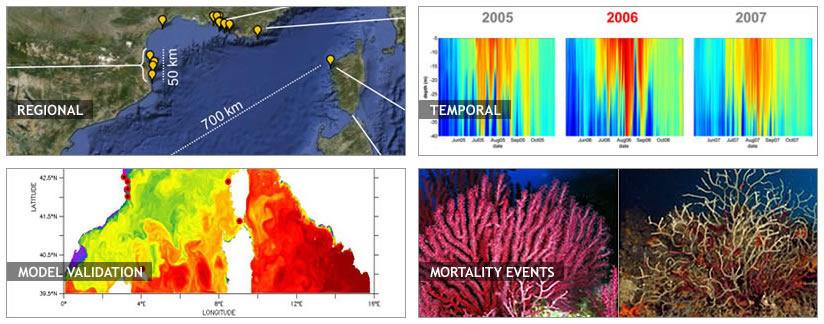
Past, present and future in situ temperature conditions
- Insights on coastal thermal regimes and seasonal stratification dynamics over extensive spatial and temporal scales for the very first time in the Mediterranean
- Analyze warming trends and marine heatwaves in nearshore surface waters (0-40m)
- Build more realistic 21st century coastal warming scenarios
Biological impacts
- Insights on mass mortality events affecting the coastal benthic biota over extensive spatial and temporal scales for the very first time in the Mediterranean
- Analyze relationships between T-conditions and biological responses, including episodic events, in particular the onset of mass mortality events, but also changes in distribution, behavior and phenology
- Test and complement Climate Change approaches for coastal and Marine Protected Areas, from local to regional scale
T Conditions / Warming
Stratification dynamics in the NWM at different spatial scales
T-MEDNet data base allowed for the very first time the characterization of the coastal waters (5-40 m) local stratification dynamics from hours to years. In the NWM, contrasted conditions are experienced by coastal benthic communities at different spatial scales.
Not only under the influence of general circulation, but also due to local topography, bathymetry and wind driven processes such as upwellings (top and bottom right) or downwellings (bottom left). Contrarily, in the Balearic islands, stable and deep stratification prevails.
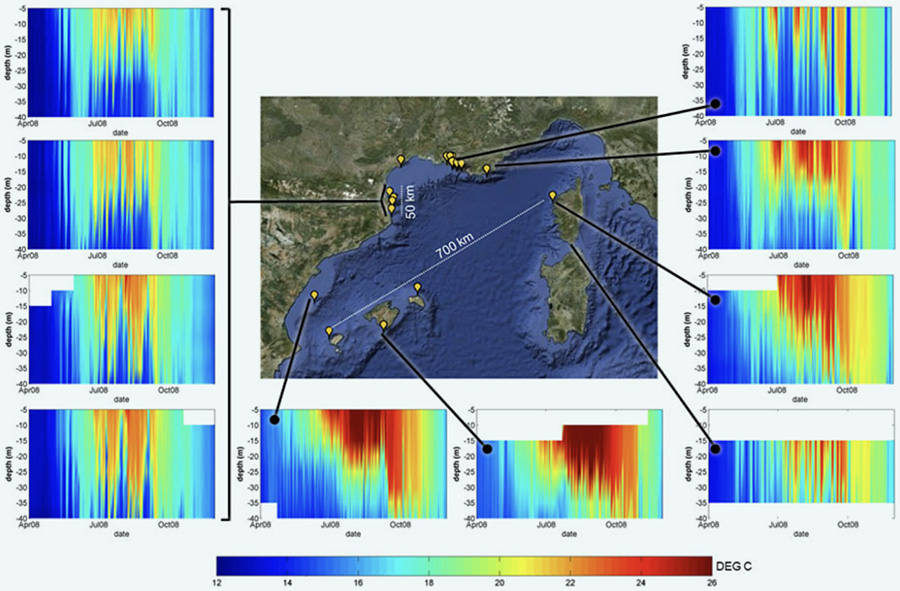
Interannual variability-influence of regional heatwaves
T-MEDNet data base has been crucial for the analysis of the inter annual variability of coastal waters (5-40 m) stratification dynamics under various climatic forcings, including the regional heatwaves of summers 2003 and 2006 (the warmest August and July over France since 1950 respectively).
In 2006, the strong climatic anomaly resulted in contrasted seawater stratification patterns depending on localities. The high resolution temperature series also allowed to better characterize warm conditions as shown here with the number of days above 23 and 25 °C. Years during which mortality events occured are shown in red.
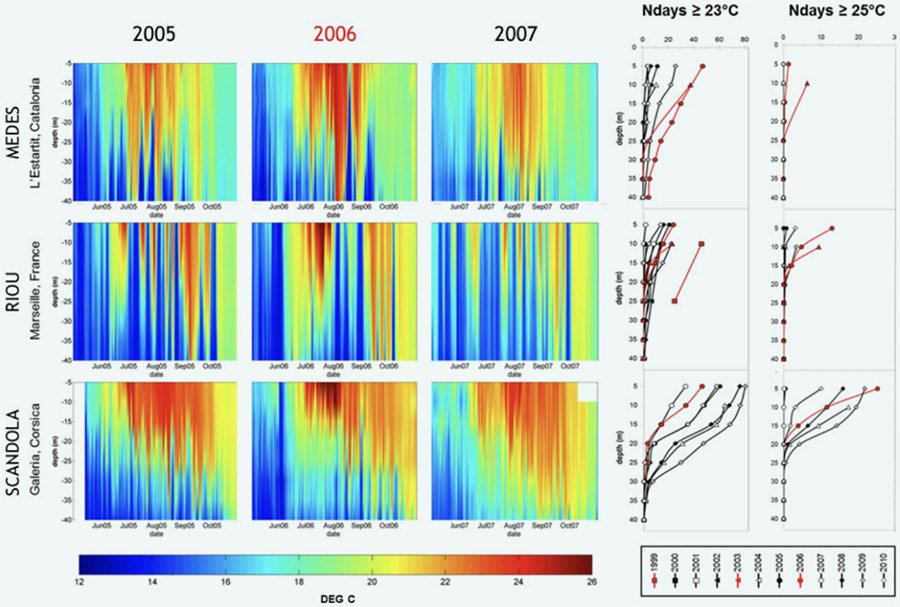
Biological effects
Characterization of temperature conditions during mass mortality events
Severe mass mortality events of marine invertebrates were observed during 1999 and 2003 summers affecting more than 30 species in the NW Mediterranean region. In 2006 lesser extent event was as well recorded. These mortality events were concominant with anomalous temperature conditions.
T-MEDNet high resolution temperature records allowed to detect a significant increase on the exposition to warm temperature conditions (23 and 25 ºC) which was clearly related with the increase on the percentage of affected colonies of the red gorgonian Paramuricea clavata (data from the Marseilles area).
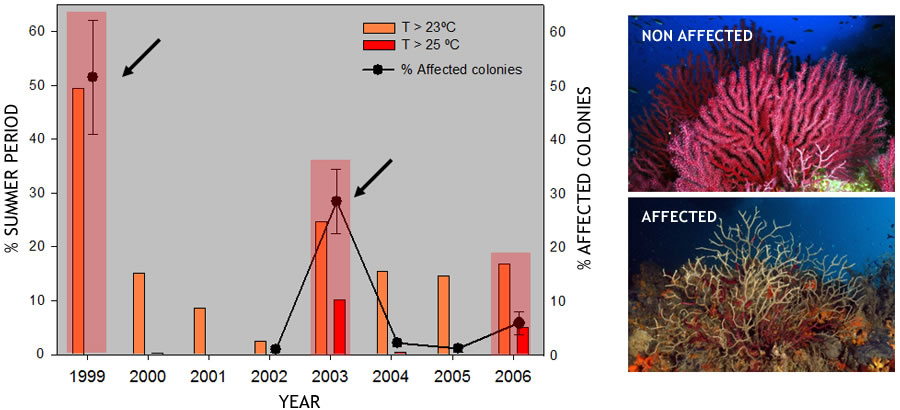
Forecast future warming conditions

T-MEDNet climatic series have already been used to evaluate 3D hydrodynamical models in coastal areas over a range of hydroclimatic conditions. So far, MARS3D-MENOR and -RHOMA realistic models developed by IFREMER benefited of this evaluation, showing for instance, that in the Marseille area, upwelling process and annual cycle are quite well reproduced by the simulations.
Qualification of the high resolution model MENOR that covers a vast domain are being conducted for all T-MEDNet available sites and years. Overall, together with dedicated simulations work, this should permit to better anticipate impact of climate change on coastal habitats and ecosystems.
T-MEDNet serves
Marine Protected Areas managers, marine scientists national oceanographic agencies, hydrographic offices, policy makers and the interested general public.
T-MEDNet is an initiative of the MedRecover research group based at the Institute of Marine Sciences (ICM-CSIC) in Barcelona (Spain).




